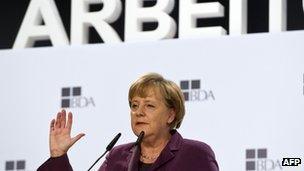Merkel sees EU treaty change as solution, not eurobonds
- Published

Mrs Merkel said that treaty changes were an immediate part of solving the crisis
German Chancellor Angela Merkel has said that EU treaty changes rather than eurobonds will help solve the eurozone debt crisis.
Ahead of European Commission proposals for bonds backed by all 17 eurozone states, she said what was really needed was a political response.
Mrs Merkel argued if there was to be a debate on eurobonds, it should be at the end, not the middle of the crisis.
Germany fears that it would bear much of the cost of jointly backed bonds.
The eurobond plans, due to be presented by the commission on Wednesday, are attracting increasing support, despite Germany's opposition. Greece's new Prime Minister, Lucas Papademos, said on Tuesday that eurobonds "or similar tools could provide the means to overcome the crisis".
Addressing Germany's confederation of employers in Berlin on Tuesday, the German chancellor said that if changing treaties proved too difficult on an EU level, they would be dealt with instead by the 17 members of the eurozone.
"We have to change the construction of the euro area," she said. "Treaty changes are for me an immediate part of solving the crisis, the political response to a politically derived confidence crisis."
Reports on Monday suggested that Britain would accept a "narrow" amendment of the EU's Lisbon Treaty covering the eurozone in return for a deal on the EU's working time directive.
Leaked document
Although full details of the commission's proposals are not yet known, a leaked draft document indicates they would involve three options
An extensive scheme that would completely replace national bonds and would require each eurozone government to guarantee the debt of other countries
A lesser scheme that would see national bonds partially replaced with eurobonds up to a limit that could relate to how closely a country adhered to strict rules.
The replacement of some national bond issues with a limit on guarantees
Although the prospect of eurobonds has aroused widespread criticism from German politicians, European Economic and Monetary Affairs Commissioner Olli Rehn said that they would have to be implemented with very strict rules.
"It is clear that any type of eurobonds would have to go in parallel, hand in hand, with substantially reinforced fiscal surveillance and policy co-ordination, as an essential counterpart."
But German Finance Minister Wolfgang Schaeuble warned on Wednesday that the proposals would not confront the main problem of requiring eurozone members to tackle their debts. "As soon as you start talking about eurobonds... you take away the pressure on these countries," he told German radio.
The idea of eurobonds is due to be discussed by the German chancellor on Thursday, at a meeting with French President Nicolas Sarkozy and Italy's new Prime Minister, Mario Monti.